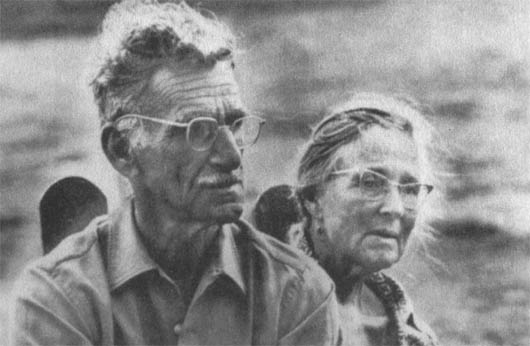In 1934, when George Oppen was 26 years old, he published Discrete Series, a volume of his poetry. It included a preface from Ezra Pound, then living in Rapallo, Italy, which ended with these lines: “I salute a serious craftsman, a sensibility which is not every man’s sensibility and which has not been got out of any other man’s books.” It was accurate in many ways, emphasizing Oppen’s carefully cultivated identity as a craftsman, a skilled laborer and mechanic, even as it contained a slight dig at Oppen’s own lack of erudition or learning. Shortly after its publication, George and his wife Mary would abandon poetry for many years, joining the Communist Party and becoming active organizers in several Popular Front efforts around labor, housing, and relief in New York City.

It would be roughly 25 years before George Oppen would return to writing poems, and almost 30 before he published another book of poems, his The Materials, published in 1962 by New Directions Press (with the support of his sister June Degnan Oppen, who was then the publisher of the San Francisco Review).

That same year, Oppen sent a copy of The Materials along with this letter to Ezra Pound, who was then living in Italy and suffering from fairly severe depression after the failure of European fascism, his own arrest for treason and subsequent 12-year incarceration in St. Elizabeth’s Hospital, a federally run psychiatric facility in Washington, D.C.:
Dear Pound,
You’ll see that the back cover of this book quotes an introduction you wrote for my poems many years ago. I was in fact about twenty-one.
I suppose if we should take to talking politics to each other I would disagree even more actively than all those others who have disagreed, but there has been no one living during my life time who has been as generous or as pure as you toward literature and toward writers. Nor anyone less generously thanked.
I know of no one who does not owe you a debt.
George Oppen
As this letter may in part make clear, Oppen had complex and ambivalent feelings about Pound. He and Mary certainly disagreed with (perhaps even hated?) his politics, and among the scraps of paper Oppen had in his working space at the time of his death was this note, pinned above his writing desk:
A Note to Pound in heaven:
Only one mistake, Ezra!
You should have talked
to women.
What for me is remarkable about all of this is what seems to be Oppen’s extraordinary kindness. Certainly there was respect for Pound, the man and the poet, and they had their own personal history. But it seems to me that Oppen did not have to write to Pound, nor acknowledge his own debt to Pound’s extraordinary personal generosity, nor omit Pound’s ferocious anti-semitism or monstrous politics (of which Oppen was certainly aware). But he did, and with what I think is wonderful grace and great magnanimity. In 1980, just a few years before he died, and in the period where Oppen was suffering from the Alzheimer’s which would ultimately claim his life, he tells Burton Hatlen and Tom Mandel this story, of his and Mary’s going to meet Pound in James Laughlin’s (the publisher of New Directions) office:
GO: We wept on each other in the New Directions office, that’s what happened.
MO: In 1969.
GO: And I don’t know how sincere he was or wasn’t. That was when Pound came out of St. Elizabeth’s and Jay Laughlin had arranged small groups to talk to Pound. Everyone was somewhat afraid that-
MO: We met in Jay’s office.
GO: We met in Jay’s office-that was our little group-he wanted to keep the groups small so that the news shouldn’t break out that Pound was roaming around free or anything of that sort that might make waves. And we were waiting for Pound to come in and ah, making chatter and finally Pound arrived with Olga and sat absolutely dead silent and everybody became nervous and started chattering and Jay had a moment of inspiration and said, “Ezra, show George your new book.” And Pound in a sepulchral voice said, How do I know he wants it?” You understand well enough what that means. So I stood up and walked over to him and held my hand out and said, “I want it” -a very dramatic thing-and Pound stood up and once he stood he was very close to me. We were in fact touching, and Pound began to weep, so I wept. So we went home. Neither of us could speak, so we went home, and it’s impossible to understand-
MO: That book?
GO: No, to understand Pound.
MO: But that book [Drafts & Fragments of Cantos CX-CXVII, 1968] also had the blacked-out phrases and so on that Jay would not print-the unspeakable and anti-Semitic-
GO: I think Pound in fact was caught in the idea of being macho, though the word didn’t exist at that time. He was going to be the pounding poet, the masculine poet.
There is obviously great pathos in this story, and some wry irony, humor, and self-deprecation (Oppen’s description of his actions as “a very dramatic thing” is not to be read as virtuous, if you understand Oppen), but what moves me is the way that this story plays out as a series of embodied gesture. Oppen stands up and walks over and holds his hand out and Pound stands up and the two of them are touching and Pound begins to weep, so George Oppen weeps, and neither of them could speak, and then they go home. Perhaps some might read this story as a failure of masculine communicativity, but that’s not how I choose to read it, and I don’t think that’s how Oppen chose to interpret it, either.
All this to say that I want to be generous in this way, even to those whose ideas and speech I find hateful, to return generosity for generosity, and to see other beings in their full complexity, wherever I can. I want to enact the embodied gestures which show clearly that I want to receive the work and gifts of others and which unlock the possibility of remorse and reconciliation, even if poorly articulated. And I am grateful to the letters of George Oppen for what I see of these lessons there.


2 responses to “Expressing Gratitude”
[…] Lessons from Oppen’s Letters: Expressing Gratitude (steelwagstaff.com) […]
Your ending with such an insight about generosity was a suprise and well thought out. It is good to see someone take Oppen so seriously and to heart. He has meant a lot to me over the years and I keep trying to get ahold of the letters but haven’t been able to so far. Your enthusiasm will encourage me to try harder. You know when Oppen and his wife met Pound overseas at the one meeting they felt he had gone off the deep end because he had lost touch with what was American in him, that he should have spent more time in America. And I think there is a lot of insight in that simple truth. Look forward to more of your writings.